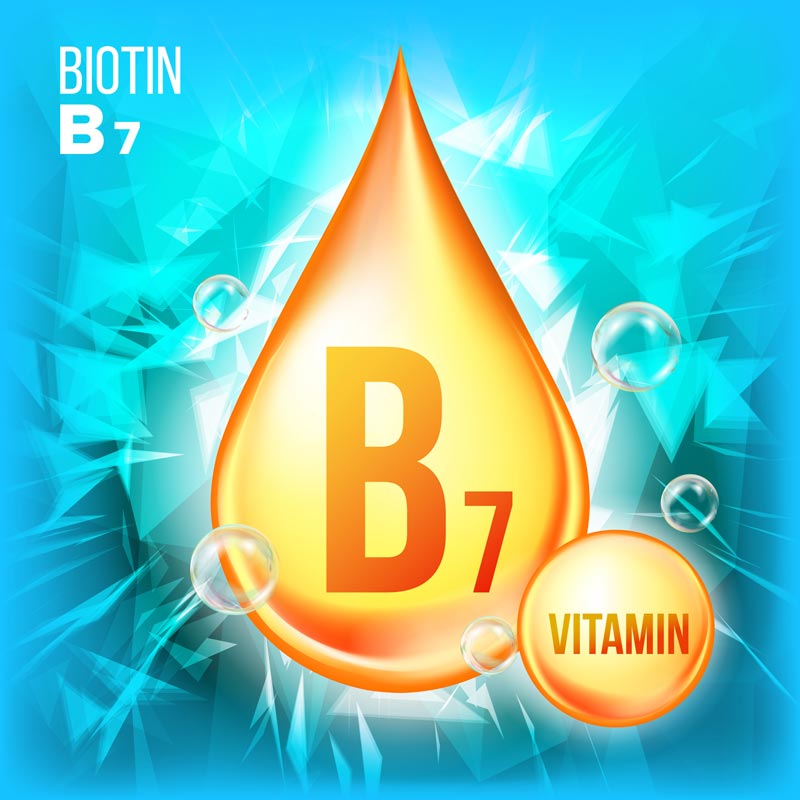What Is Biotin?

Biotin is commonly known as vitamin B7, and has also been referred to as coenzyme R and W Factor. It was originally called vitamin H - the H signifying the German word haut, which means skin. As a supplement, biotin is typically used to prevent or treat deficiency in this nutrient. A water-soluble vitamin, biotin is found in many foods (e.g., meats, egg yolks, nuts, beans, and fish) but the biotin in most foods is not readily bioavailable. It is also synthesized by naturally-occurring intestinal bacteria, and is believed to be stored in mitochondria in cells.1-6
Biotin is an important ingredient in crucial metabolic reactions and releasing energy at the cellular level. Maintaining a healthy balance of biotin in the body is essential to normal organ functioning - especially in the brain and heart. It is also necessary for helping to prevent DNA damage and keeping hair, skin, and nails healthy.2-3, 7
Insufficient amounts of biotin can affect the health and growth of nerves and bones. Deficiency was once considered rare because many foods contain biotin, the body appears to need only small amounts of it, and until recently diagnostic testing for functionally-deficient levels of biotin were not available. However, this clinical outlook is changing.3-5
Experts suggest that in fact many of the food sources of biotin are not readily digested and therefore dietary intake has been overestimated. Other than egg yolks, organ meats, and some cheeses, most foods are considered poor sources of biotin. Combined with the number of disorders or other factors that can cause or increase the chances of developing biotin deficiency, some people may indeed be at high risk of the full-blown condition or long-term biotin insufficiency. Pregnant women and infants may be particularly at risk for biotin insufficiency.3-5, 8
Both insufficient biotin and biotin deficiency can cause a range of health problems. In fact, the discovery of biotin occurred in 1931 while trying to determine the cause of egg white injury - characterized by hair loss, skin rashes, and neurological problems connected to eating raw eggs. When consumed uncooked, a protein in egg whites (avidin) binds to biotin and prevents it from being available in the body. The substance discovered in liver that could prevent or reverse egg white injury was biotin. Interestingly, this powerful avidin-biotin bonding mechanism is utilized in many different diagnostic tests and cancer therapies as a way to detect or target certain molecules.2, 5, 8-9
Lacking the enzymes necessary for the body to absorb and use biotin (as in the case of hereditary deficiency of biotinidase and holocarboxylase synthetase , can lead to severe health consequences (e.g., hearing loss and mental retardation). However, 5-10 mg doses of biotin supplementation can often prevent or counteract these impairments if biotin deficiency is diagnosed early. Although blood tests of biotin levels in plasma are not considered an accurate measure of a person's biotin status, there are several urine tests that can more closely determine biotin status. Biotin can also counteract the biotin-depleting side effects of certain drugs for epilepsy.5, 7, 10
In addition to its essential health functions and ability to resolve or reduce the symptoms of biotin deficiency, biotin may also offer preventive or therapeutic benefits for a number of illnesses or conditions:1
- Brittle nails (based on successful treatment of horse hoof diseases with biotin)
- Cancer treatments (e.g., for brain, breast, colorectal, and lymphoma cancers)
- Diabetes
- Hair loss
- Heart disease
- Neurological disorders
- Skin conditions
- Wound healing
Biotin is generally considered both safe and well-tolerated, with no adverse effects reported when taken at dosages of up to 10 mg/day (although some question has been raised about the safety of high dosage biotin). A number of drugs, including antibiotics, can cause biotin deficiency. Biotin use may also cause inaccuracies with certain thyroid lab tests.1, 5


